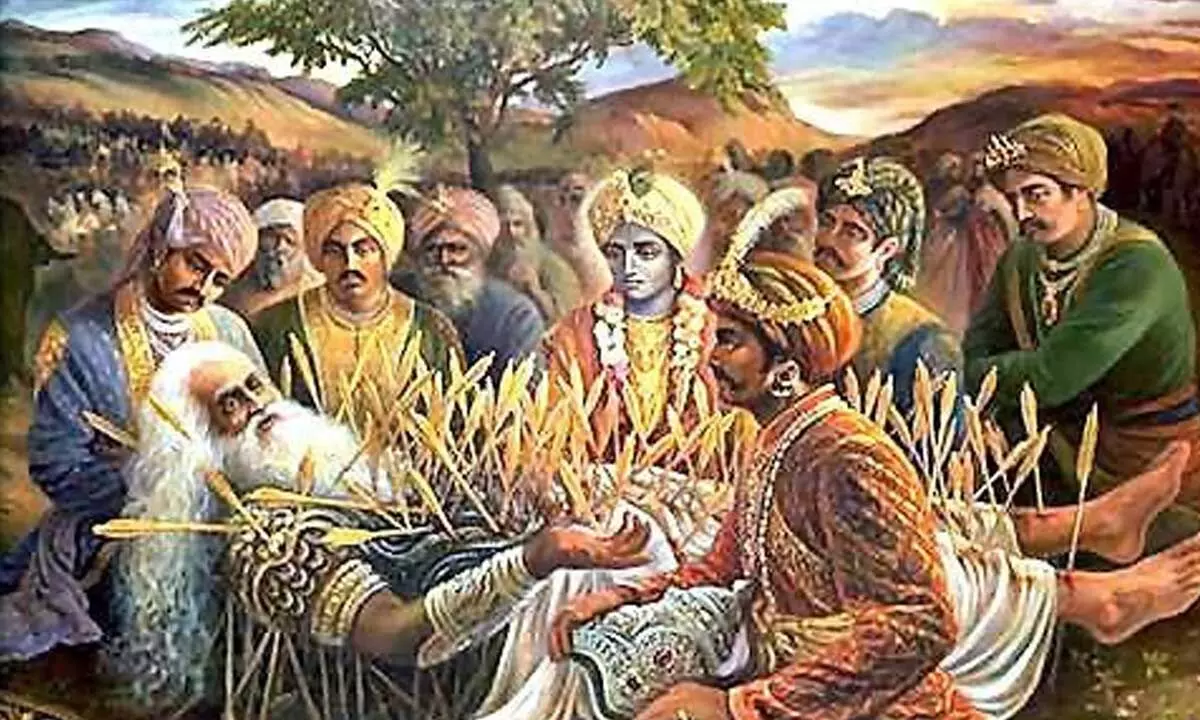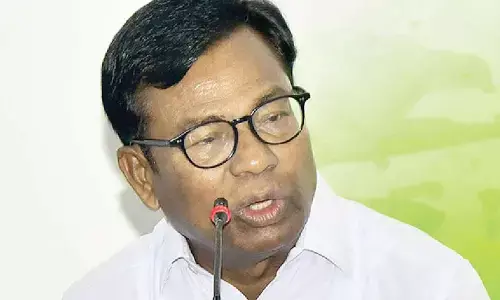Raj Dharma vital for peace & prosperity

Vedas, Sri Ramayana, Mahabharata and Bhagavata have incorporated various aspects of great ‘Sanatana Dharma’ in different contexts, including ‘Raj Dharma’, or morals, ethics, and principles of governance to be strictly followed by the ruler.
Vedas, Sri Ramayana, Mahabharata and Bhagavata have incorporated various aspects of great ‘Sanatana Dharma’ in different contexts, including ‘Raj Dharma’, or morals, ethics, and principles of governance to be strictly followed by the ruler. If only they are contextualized, suiting to changing times, keeping the spirit intact, then eternal peace and tranquility prevails incessantly everywhere. Sri Rama’s explanation of Raj Dharma to his younger brother Bharata, Kanika’s two-way Raj Neeti to Duryodhana, Sage Narda’s views on Raj Dharma as told to Dharmaraja, Raj Purohit Dhoumya’s politico ethics class to Pandavas when they were in exile, and more importantly, the various Dharmas preached by Bhishma from his death bed to Dharmaraja in Mahabharata’s ‘Shanti’ and ‘Anushasana’ chapters, are worth mentioning.
Kanika’s Raj Dharma was in the background and context of Kauravas’ poorer performance than Pandavas in the talent display of their learning experience, received from Guru Dronacharya. To pacify aggrieved Duryodhana, his wicked uncle Shakuni engaged Kanika to guide him about the further course of action. His Raj Dharma included qualities of king like: overriding power, adopting penal system, guiding people on the path of righteousness, well behaviour etc. One outstanding advice of Kanika was that Raj Dharma included entertaining even the worst enemy until he is required and once the necessity is thru, the same enemy ‘Shall be destroyed like a clay pot’ on a rock, absolutely without any hesitation.
Raj Dharma advocated by Sage Narada was in the context of Dharmaraja’s initial days of governance from ‘Maya Sabha.’ Emphasising the essentiality of strict adherence by the King to the moral code and ethos established by his ancestors, Narada counseled him, among others, to know what constitutes Dharma-Artha-Kamas, to concentrate more on Dharma, to appoint eligible and efficient persons to assist in governance, to spend only a part of income but not more than it, to establish an independent news gathering and dissemination network etc.
Contents of Humble and Common Service Code, as stated by Purohit Dhoumya, to be followed by Pandavas in anonymity, in Virata Kingdom to serve the King in various capacities, are equally applicable even now, to everyone engaged in some job or other. The essence is that one needs to be utmost careful with the boss, enter the place of work cautiously and most properly, occupy seat that absolutely suits his position, dress and shape should not be deformed, should know the time and the context before speaking etc. Taking advantage of intimacy with the boss, one shall not exceed the limits and interfere in matters unconcerned etc., form part of the code.
On completion of Kurukshetra War, victorious Dharmaraja, following his coronation, on the advice of Lord Sri Krishna, approached Bhishma who was on the death bed made of Arjuna’s arrows (Ampa Shaiyya). He requested Bhishma to enlighten him the essence of omniscience, Vedas, Vedanta, and philosophical knowledge encompassing every aspect of ‘Raj Dharma.’
Bhishma underscored the equal importance of ‘Divine Grace’ and ‘Human Effort’ to achieve success. He said that the king who envisions peace and harmony will be successful and can get all comforts. The seven key components namely, head, minister, friend, treasury, state, fort, and strength, should be identified and managed appropriately by the king. King shall notblindly believe anyone, which does not mean to disbelieve everyone. Welfare, development and safety of people shall be the priority of a king, said Bhishma.
Referring to ‘Brahma Niti Shastra,’ the ethical discipline and penal code, Bhishma said that initially people and king were protecting each other, but with the passage of time, gradually the Dharma got destroyed and people committed offences and destroyed Vedas. As a result, different gods (Devatas) prayed to Brahma to rescue them. In order to establish salvation universally. Brahma composed ‘Hundred Thousand Chapters of Ethics’ with Sapta Sopanas, Penal Code, Dvadasha Raja Mandalas and Panchopayas, known as ‘Brahma Niti Shastra.’
Subsequently, it was edited to 10,000 chapters by Virupaksha and named ‘Vaishalakshya.’ Later, Indra further edited it to 5.000 chapters. It was further shrunk by Brihaspati to 3,000 chapters and Shukracharya to 1,000 chapters. Finally, to enable its wide reach and comprehensibility, Maharshis abbreviated it to a greater extent. Having said this, Bhishma advised Dharmaraja to meticulously follow the principles enunciated in this. He said that, the king shall practise righteousness on the path of truth. And that is precisely was the Raj Dharma, said Bhishma.
When Lord Rama was in Chitrakoota, his brother, king designate Bharatha came to plead with him for his return to Ayodhya, abandoning the exile, and take over the reins of empire. During the conversation between the brothers, Sri Rama highlighted various aspects of ‘Raj Dharma’ which holds good cent per cent, even till this day. Broadly they are: keeping people happy and listening to them, offering salutations to elders, serving (Gurus) teachers, choose ministers with knowledge of moral code and Shastras, better IQ, capable of face reading etc.
Rama added that king is not supposed to deliberate on secrets either with everyone or with single individual, and not to disclose his thoughts before they take the shape of action. He shall not delay the work to such an extent that it spoils the work itself. It is better to have one intelligent and efficient person with the king rather than 1000 jokers. Important was, appointing adequate Tirthas as ministers, private secretary, prince, commander-in-chief, gate keeper, palace controller, superintendent of jails, revenue collector, judge, accountant general, munsif, magistrate etc. In conclusion, Sri Rama advised Bharata that he should never, even at the cost of his life, deviate from the path of Dharma and ‘Raj Dharma.’
The Hindu concept of Triumvirate (Tri Murthy) consists of ‘Three Gods,’ Brahma, Vishnu and Maheswara (Shiva), believed to be manifestation of one Single Unique God, the Parabrahma or Virat-Swaroop, who is Omnipotent, Omnipresent and Omnicompetent. The Triumvirate independently and interdependently takes care of Creation (Srushti), Constancy (Sthithi) and Annihilation (Laya) of all living and non-living. A parallel may be drawn between the Trinity of Hindu Mythology and the organs of governance - legislature, executive and judiciary, the ‘Three Estates’ or the ‘Three Pillars’ of Indian democracy. This democratic Trinity shapes the destiny of our Great Nation. Our Constitution which is a mix of Ancient (Sanatana) and Modern (Adhunika) Dharmas, clearly defined the roles of these three institutions, and shall continue to be ever dynamic generally and in the context of adhering strictly to ‘Raj Dharma,’ to keep all Indians happy for ever and ever.
Former Prime MinisterLate PV Narasimha Rao, according to his media advisor, late PVRK Prasad, invariably used to put one question, ‘Is it Constitutional’ whenever an issue concerning governance was brought to his notice. That was and is the greatness of our ‘Constitution’ which is nonetheless akin to ‘Brahma Niti Shastra’ or the ‘Brahma Ethical Discipline’ which fundamentally speaks among others, ‘The Raj Dharma’ too. Why not successors ‘Keep it Up’?














